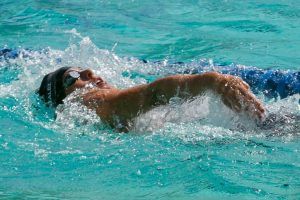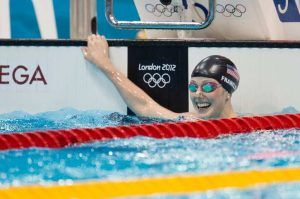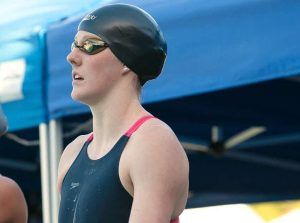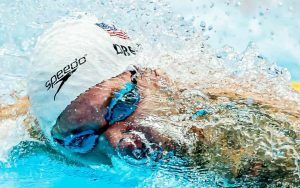Swimmers invest a lot into swimming well.
We shave our bodies (some more successfully than others). Obsess about how to beat the drag imposed on us by water. And of course, spend a hysterical amount of time staring at a black, unblinking line.
And yet, for most swimmers, if they spared a couple minutes each evening to sit down with pen and paper, they could maximize all that time spent in the water.
When it comes to swimming faster there are not many things as powerful and as motivating as the simple act of writing out your workouts.
Not only does it give you a powerful sense of accountability and ownership over your swimming, but it is also proven to ultimately help you swim faster. Which, if you are the kind of swimmer who enjoys going super fast, is right in your wheelhouse.
Here are 5 research-backed reasons that spending a couple minutes each evening after practice with your log book will help you become a faster swimmer:

1. Writing down your goals makes you more likely to achieve them.
Our goals tend to float along with the current of the rest of our thoughts.
One day we think we are invincible and can do everything, and as a result we visualize and think about how far our talent and dedication could take us. And yet the next, fresh from a setback or a bad swim practice, we sink back into low expectations and hopes.
Writing out your goal makes it more real. It yanks your goal from the ebb and flow of your mind and throws it into reality.
Research shows that those who write their goals down vs those who simply think about them are significantly more likely to achieve them. How much more? A stunning 42%.
Here’s how to make this knowledge work for you:
- Write out your goals for the big meets of the year. Figure out what the splits have to look like. Place this prominently.
- On Sunday night write out the goals you have for the week ahead. Attendance, effort, performing little extras after practice.
- Have goals for each practice. Spend a couple minutes before each practice and write down 1-2 things to absolutely crush during that session.
Everybody thinks about the great things they’d like to accomplish.
But if you are serious about wanting to see them through the first step is in writing it out on paper in order to inspire some action.
2. You’re twice as likely to be successful.
If there is a way that doubled the likelihood of you being more consistent with the things you set out to do, you’d jump all over it, wouldn’t you? This is the power that journaling your workouts can have.
During a study of over 1,700 people at John Hopkins and Duke researchers found that the participants who recorded their daily food intake in a log lost twice the amount of weight compared to those that didn’t.
Which makes sense, when you think about it.
If you are writing out your swim practices you are more likely to see the patterns and habits in your training, as well as your lifestyle outside of the pool.
It provides a measure of objectivity to our training that can only help us be more honest with ourselves about how hard we are actually working.
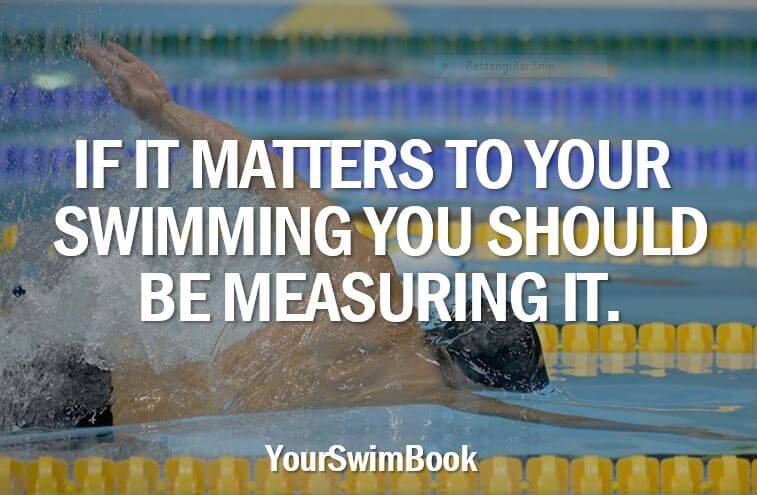
3. You’ll take responsibility for your swimming.
Oddly enough, the mere practice of tracking your workouts has the effect of making you want to take responsibility for your swimming. Knowing that you are going to have to write out your next swim practice later on is enough to make you want to give a better effort.
A meta-analysis of weight loss studies from 1993 to 2009 found that participants who were asked to self-monitor their eating and fitness regimen were more likely to exercise more. In other words, knowing that their behaviors and actions were being measured was enough to push them to give an honest effort.
Just from personal experience I cannot tell you how many times I have been mid-practice, struggling along at a C+ effort, when the very thought of having to write out a mediocre workout in my logbook nudged the effort dial up a bit.
The idea of disgracing my logbook with an awful workout was often enough to salvage what was otherwise a waste of a swim.
Will tracking your workouts guarantee you A+ workouts every time you dive into the water? Will downloading all of the data, including stroke counts, splits and total volume from your swim watch of choice magically improve your bad workouts?
Nope.
But it will help turn enough of those D and C workouts into C+ and B workouts to make those couple minutes of logging totally worth it.
4. Planning your training makes you more likely to stick to it.
If you use a training log to its fullest, this means that you are setting (written!) goals for your training as well as the season.
Another way to supercharge your swimming goals is to affix a deadline.
For some swimmers this might be intimidating or imposing, but research has shown that when participants stated where and when they would complete a specific task they were more likely to complete it.
It’s easy to think and dream about the things we would love to do in order to improve in the water.
After all, these probably sound familiar:
One day I will start doing more core work. When I am up to it I’ll start doing extra dive work after practice. When I feel like it I will start kicking out to the 10m mark on all my push-offs.
Instead of wishy-washy goals sit down with your log book and write down when, where and how you are going to do the things you want to do.
5. It will give you regular and immediate motivation.
One of the most mentally challenging aspects of being a swimmer is the patience that is required to excel.
We train our brains out for a couple workouts and are disappointed when things don’t immediately improve.
We work hard for months on end, often getting slower in practice as the fatigue and work accumulates, creating a situation where we are creating gains but they are buried under levels of fatigue.
In these circumstances, it is easy to see how we can get frustrated and disillusioned with the process.
After all, we live in a culture that demands instant gratification, so why should it be any different with our swimming?
Tracking your workouts in your log book from day to day gives you an immediate sense of gratification and comfort in knowing that you showed up, worked hard, and are staying true to the long term game plan.
The results are right there on paper for you to see and feel good about.
Seeing the work you have invested in the pool will help you feel confident, knowing that those big-time performances are coming.
Sure, these little motivational jolts might not be as deep as when you go a best time, but the momentum that comes from regular “small wins” builds up into a tidal wave of accumulated action and results.
The Takeaway
If you are serious about your swimming, you gotta be measuring it.
It’s as simple as that.
Our focus and energy will always be directed towards the things we track and measure, so sit down with your log book, write out some goals, track the biggies in your training, and unleash some faster swimming.
More Articles Like This
5 Best Apps for Swimmers. Looking to get more granular with your swim workouts? Track everything from distance, average pace, to your heart rate with this selection of the best swim apps in the pool.





